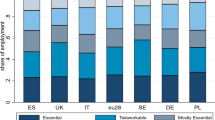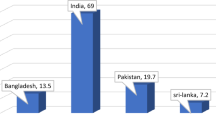Abstract
Trade agreements have become a growing source of concern due to the potential job losses that some sectors can incur as a result of increased competition. Although the economic literature shows that the overall results of trade liberalisation are positive, some sectors may be adversely affected, leading to job losses and adjustment costs. In 2006 the European Commission established the European Globalisation Adjustment Fund (EGF) to help workers who have lost their jobs due to globalisation. Despite the relevance of the EGF as a trade-adjustment mechanism, the existing evidence suggests that its use is still limited compared to its potential. This paper reviews some of the constraining factors identified in the latest mid-term evaluation by the European Commission and suggests several avenues for further improvement.
Similar content being viewed by others
Author information
Authors and Affiliations
Corresponding author
Rights and permissions
About this article
Cite this article
Cernat, L., Mustilli, F. Trade and Labour Market Adjustments: What Role for the European Globalisation Adjustment Fund?. Intereconomics 53, 79–86 (2018). https://doi.org/10.1007/s10272-018-0726-7
Published:
Issue Date:
DOI: https://doi.org/10.1007/s10272-018-0726-7




